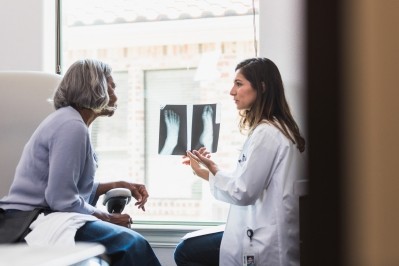Prune consumption may prevent bone loss for postmenopausal women

Prunes can reduce proinflammatory cytokine secretion and suppress higher circulating levels of activated monocytes—a type of white blood cell in the immune system. This has implications for preventing bone loss.
“Pharmacologic drugs for osteoporosis have been associated with adverse effects and poor compliance; as such, nonpharmacologic alternatives for bone loss have grown in popularity over the recent years,” the team of U.S. researchers wrote in the Journal of Nutrition. “Epidemiologic evidence supports the role of fruit and vegetable intake in preventing bone loss in postmenopausal women. Prunes have been extensively studied as a functional food for improving bone health after menopause and are abundant in bioactive compounds, including vitamins, minerals and phenolic compounds.”
The study was funded by the California Prune Board.
Anti-inflammatory and antioxidant mechanisms
Evidence from in vitro and animal studies suggests that prunes and their polyphenolic compounds improve bone outcomes through anti-inflammatory and antioxidant mechanisms, the researchers noted.
In the current study, they sought to bolster this line of research by investigating the effects of 12-months of prune supplementation at two doses (50 g/d and 100 g/d) in a group of 235 postmenopausal women between the ages of 55 and 75 years. Outcomes were evaluated through a comprehensive panel of immune, inflammatory and oxidative stress markers.
“We hypothesized that prune supplementation may dose-dependently reduce inflammatory mediators and markers of oxidative stress in postmenopausal women,” the researchers wrote. “We demonstrated a significant decrease in the percentage of circulating monocytes in the 100 g prune/d group compared with the no-prune control group at 12 months.”
Inflammaging
Inflammation is a major contributing factor in the pathophysiology of age-related chronic diseases, including cardiovascular disease, diabetes mellitus, cancer, rheumatoid arthritis and osteoporosis, the researchers stated.
“Inflammaging” is the chronic, low-grade inflammatory state that occurs often with aging and can result in tissue damage by inducing oxidative stress. The researchers asserted that hypoestrogenism during menopause also increases circulating inflammatory mediators, which is linked to an adverse cardiometabolic and osteoporotic risk profile in postmenopausal women.
“Estrogen is an important hormonal regulator of proinflammatory cytokines, including IL-1β, IL-6 and TNF-α, that play a key role in postmenopausal bone loss," the researchers explained. "Estrogen inhibits the expression of inflammatory cytokines within the bone microenvironment, resulting in a balanced state of bone turnover."
They noted that estrogen deficiency resulting from ovarian senescence during menopause disrupts this balance, and thus "an elevated inflammatory profile may be linked to accelerated postmenopausal bone loss and may represent a potential target for osteoporosis therapies.”
Source: Journal of Nutrition
“Prune Consumption Attenuates Proinflammatory Cytokine Secretion and Alters Monocyte Activation in Postmenopausal Women: Secondary Outcome Analysis of a 12-Mo Randomized Controlled Trial: The Prune Study”
Published online ahead of print, doi: doi.org/10.1016/j.tjnut.2023.11.014
Authors: J.J. Damani et al.















